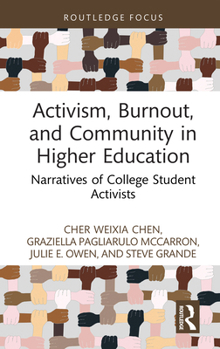Activism, Burnout, and Community in Higher Education: Narratives of College Student Activists
This illuminating volume explores the often-overlooked relationship between college student activism and well-being, drawing on a multi-phase study that explores college students' perspectives on how their activism impacts their well-being.
Based on a study of 119 US college students, the authors share their findings through a constructivist, qualitative lens, revealing three key themes: The link between student activism and students' identities, the non-negotiable time costs of activism and associated burnout, and the ways that students and higher education can benefit from a different way of considering university and community care. With scholarship exploring the connections between college student activism and well-being still nascent, this book pioneers a fresh understanding of the intersection between student activism and well-being, amplifying authentic student voices throughout and offering practical recommendations for student support. Through a combination of personal narratives, data analysis, and expert commentary, it explores what inspires college student activists to work to create a more just and equitable society, as well as the prevalence of burnout and the tools students use to mitigate their struggles and improve their own well-being.
This book will be suitable for both undergraduate and graduate students as well as scholars, practitioners, and professionals in the larger higher education and social justice community.





